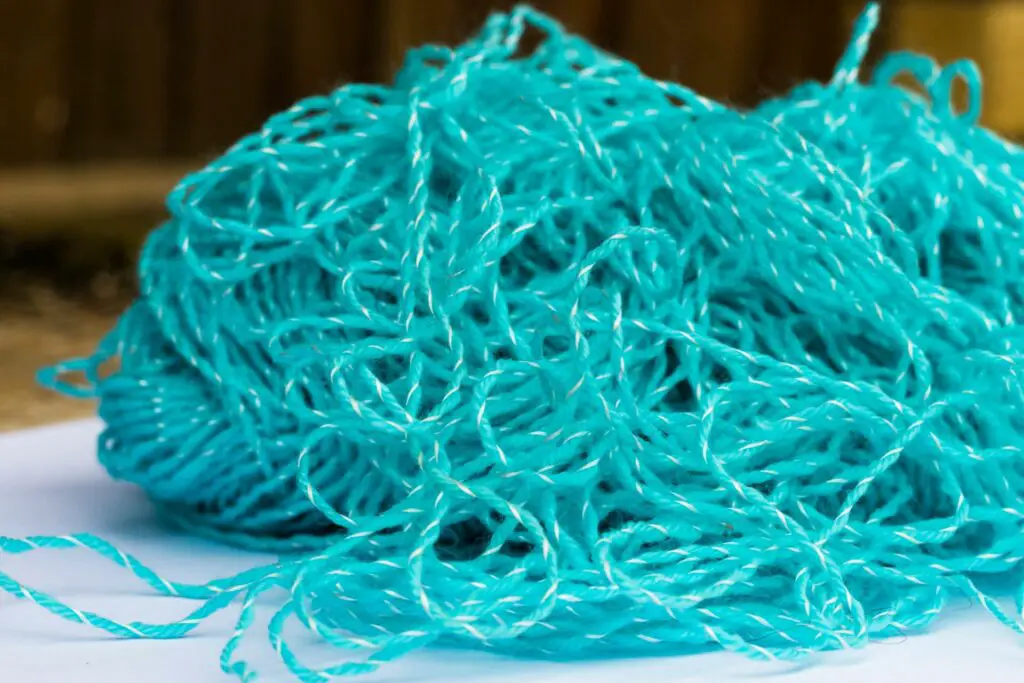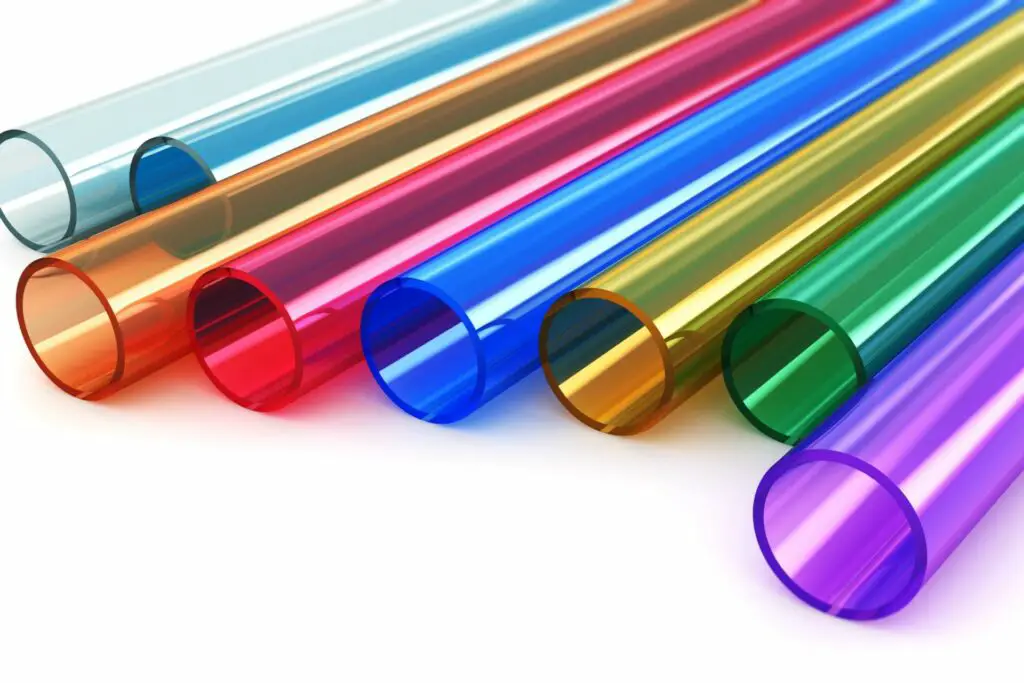Nylon bags can be found in many different forms, including drawstring bags, handbags, and even backpacks.
Bags made from nylon are generally durable, lightweight, and have a fair amount of water resistance which is why they are so popular and widely used.
But despite being so durable and versatile, are nylon bags eco-friendly?
Overall, nylon bags are not eco-friendly because nylon is a synthetic fabric that is made from plastic.
In this article, we’ll examine different aspects of nylon to determine if there is anything about them that could be considered eco-friendly, or if it’s best to choose a completely different product altogether.
1. What Are Nylon Bags Made Of?
Just as their name implies, nylon bags are made from nylon fabric. But what exactly is nylon fabric and what is it made of?
Nylon is a type of synthetic fabric that is made from polyamide plastic.
To make the plastic itself, crude oil has to be refined and then combined with other chemicals as well as undergo a series of mechanical processes in order to turn it into fibers.
To make the nylon fibers, melted nylon is usually cast or extruded through spinnerets. The fibers are then turned into yarn, and the yarn is woven together to form the fabric.
Pieces of nylon fabric are sewn together depending on what type of bag is going to be made, then drawstrings, zippers, and other components of the bag are added.
In general, nylon is resistant to heat, chemicals, wear and tear, and water. But it can sometimes be treated with other chemicals to make it more resistant to heat or make it waterproof.
2. Are Nylon Bags Eco-Friendly?
Nylon bags are not eco-friendly since nylon is made from crude oil and has to undergo chemical treatment and heavy manufacturing processes in order to create it.
Both the collection of crude oil and the manufacturing processes used have the potential to cause pollution and habitat loss.
Examples of this could be oil spills during the drilling and collection process, greenhouse gas emissions as fossil fuels are burned for energy during manufacturing, or waste runoff or improper disposal which could pollute soil and water.
Plus, there are limited ways that you can dispose of nylon bags that are eco-friendly. But we’ll touch more on that later.
3. Are Nylon Bags Sustainable?
Nylon bags are not sustainable in how they are made since the crude oil used to make them is a non-renewable resource.
Using a non-renewable resource means that once all of the crude oil has been collected, there won’t be any more of it left to make new nylon and other products.
A lot of other products are made from crude oil as well, especially those made from plastic.
You can see why using crude oil to make products is not sustainable and why nylon bags are not sustainable as a result.
4. Are Nylon Bags Biodegradable?
Most materials made from plastic either take a long time to biodegrade or won’t biodegrade at all.
That means that nylon bags are not biodegradable, which is another reason why they can’t be considered eco-friendly or sustainable.
Even going to a landfill, nylon does not biodegrade and will still be sitting there for decades and even centuries.
5. Are Nylon Bags Toxic?
As with many other plastics, a lot of chemicals are involved in the manufacturing of nylon.
Two of the main chemicals used to make nylon are hexamethylenediamine and adipic acid.
Hexamethylenediamine is a corrosive chemical while adipic acid may cause eye, skin, and respiratory tract irritation.
Exposure to chemicals found in nylon is also thought to increase the risk of cancer, particularly in women.
However, these potential toxins are most likely to cause harm if you’ve worked in a factory that produces nylon bags and not because of simply using a nylon bag.
As long as you use the nylon bag as intended and don’t try to burn it to release the chemicals into the air, the risk of toxicity from a nylon bag is low.
6. Are Nylon Bags Durable?
Nylon bags are extremely durable which is why they are so popular, especially for outdoor equipment such as backpacks and waist bags.
Nylon is naturally wear-resistant and chemical resistant and is heat and water-resistant to a certain extent.
But as previously mentioned, nylon can be coated with chemicals to make it more heat, flame, and water-resistant.
However, being coated makes nylon bags even less eco-friendly because more chemicals are used in the coating.
But because of their durability, nylon bags can last a long time and be reused over and over again as long as they are well taken care of.
7. Are Nylon Bags Washable?
Nylon bags are washable and they can be washed in the washing machine the same way as you wash other clothes that aren’t made from nylon.
However, you should avoid putting nylon in the dryer, especially using high heat, because the fibers can melt since they are made of plastic.
It’s best to let nylon air-dry after washing or if it gets wet.
8. Do Nylon Bags Shed Microplastics?
Nylon bags and other fabrics made from synthetic fibers can shed microplastics, especially as a result of being washed.
Each time nylon bags are washed, microplastics have the potential to drain out of the washing machine, ending up in the wastewater system and eventually the ocean.
This is a problem, especially if other synthetic clothing is washed with a nylon bag, as you can imagine how many microplastics would be shed.
9. Are Nylon Bags More Eco-Friendly Than Other Plastic Bags?
Nylon bags aren’t necessarily any more eco-friendly than other plastic bags.
If anything, nylon bags might be more durable and last a bit longer than other plastic bags, so they have the benefit of being more reusable.
But as far as how they are manufactured, they are actually very similar to other plastic bags.
10. Are Nylon Bags Recyclable?
Nylon bags usually aren’t recyclable as there are very few recycling programs that take them.
This is mostly due to the fact that they often have other metal or plastic components on them that would have to be separated during the recycling process, which can be very time-consuming and expensive.
With that being said, nylon fabric itself is usually recyclable.
But recycling nylon is typically done at a pre-consumer level as the makers of nylon bags can recycle unused scraps of nylon fabric since they often have more fabric to recycle.
Although it’s hard for a consumer to recycle nylon fabric and nylon bags through a curbside or community recycling program, it’s possible that some companies that produce nylon fabric may have a take-back program in which you can mail in products made from nylon that you no longer need in order for them to be recycled.
However, this is still a fairly new thing so you’d likely have to reach out to the company that made your nylon bag or visit their website to see if this is an option for you.
Even though nylon bags are hard to recycle, it is possible that some nylon bags can be made from recycled nylon.
If you still want the durability of nylon but are concerned about the eco-friendliness of it, recycled nylon bags may be a good option for you and we’ve linked a few brands below.
11. How to Dispose of Nylon Bags Properly
If you can find a nylon bag take-back program or a retail store that accepts different types of clothing, then that would be the most eco-friendly way to dispose of it.
Or, if the bag is still in good shape, you can donate it to a secondhand store or try to reuse it as much as possible.
The only other way to dispose of a nylon bag would be to throw it away. But this is not ideal because it will go to a landfill and won’t biodegrade.
3 Eco-Friendly Nylon Bags Brands
Nylon bags aren’t the most eco-friendly, but they can be more eco-friendly if they are made from recycled materials.
Here are a few brands that sell different styles of bags made from recycled nylon.
And if you’re looking for eco-friendly backpacks in particular, you can find great brands in our article here.
1. Sandqvist
Sandqvist has a line of bags made from 100% recycled nylon as well as a lining made out of recycled materials as well.
Some of the products in the line include backpacks, waist bags, hiking bags, and handbags that are great for outdoor adventures or everyday use.
2. Adidas
Popular athletic wear brand Adidas also has a line of bags that are made from recycled nylon.
Examples of their products include backpacks, tote bags, and waist bags that are great for taking to the gym or on your outdoor adventures.
3. Prada
Prada is actively working to convert all of their products that are made with raw nylon into products made with recycled nylon instead.
They have a few fashionable handbags made from recycled nylon.
The nylon they use comes from fishing nets and other nylon collected from the ocean as well as carpet and industrial waste.
3 Eco-Friendly Alternatives to Nylon Bags
Bags made from recycled nylon are the best choice if you want a bag you can use for hiking or other outdoor or athletic purposes.
But if you don’t necessarily need a bag for that purpose and want to skip nylon altogether in favor of a bag made from more eco-friendly materials, here are a few options.
1. Cotton Tote Bags
Cotton is a natural, plant-based fabric that is one of the best choices when it comes to eco-friendly fabrics.
Cotton is also sustainable and biodegradable, and tote bags made from cotton are durable and can be found in all kinds of different sizes and styles.
2. Jute Bags
Jute is also a common material to make tote bags out of, and jute is made from plant-based materials as well.
Jute is also biodegradable and compostable, however, it isn’t the most durable especially if it gets wet repeatedly.
3. Polypropylene Bags
Polypropylene is still a type of plastic so it isn’t the most eco-friendly choice, but it is still a better choice than nylon and has similar properties.
Plus, polypropylene bags can be reused multiple times and are more easily recycled as well.
Conclusion
Despite being reusable and incredibly durable, nylon bags are not the most eco-friendly.
This is because they’re made from plastic and have limited ways that you can dispose of them.
There are some bags available made from recycled nylon if you want an option that is still durable but more eco-friendly.
But if you want the most eco-friendly option, look for bags made from natural materials or materials that are easier to recycle.
You Might Also Like…
- Is Fast Food Bad for the Environment? (& What You Can Do)
- Is Fabric Softener Bad for the Environment? (+5 Eco-Friendly Options)
- Is Fuel Dumping Bad for the Environment? (& How Often It Happens)
- Is Electricity Generation Bad for the Environment? (What You Should Know)
- Is Dry Cleaning Bad for the Environment? (4 Surprising Facts)
- Is Diamond Mining Bad for the Environment? (Important Facts)
- Is DEET Bad for the Environment? 4 Effects (You Should Know)
- Is Cat Litter Bad for the Environment? (5 Common Questions)
- Is Burning Cardboard Bad for the Environment? (6 Facts)
- Is Burning Paper Bad for the Environment? (6 Surprising Facts)
- Is Burning Leaves Bad for the Environment? (7 Quick Facts)
- 4 Natural Cleaners for Quartz Countertops
- 6 Eco-Friendly Acrylic Paint Brands (For Sustainable Artists)
- 5 Eco-friendly Alternatives to Acrylic Paint (& How to Make Them)
- Is Acrylic Paint Bad for the Environment? (7 Quick Facts)
- Is Acrylic Yarn Bad for the Environment? 8 Crucial Facts
- Is Acrylic Bad for the Environment? (8 Quick Facts)
- Is Aluminum Foil Bad for the Environment? 7 Quick Facts
- Is Bleach Bad for the Environment? 6 Crucial Facts
- Is Lithium Mining Bad for the Environment? 6 Crucial Facts































